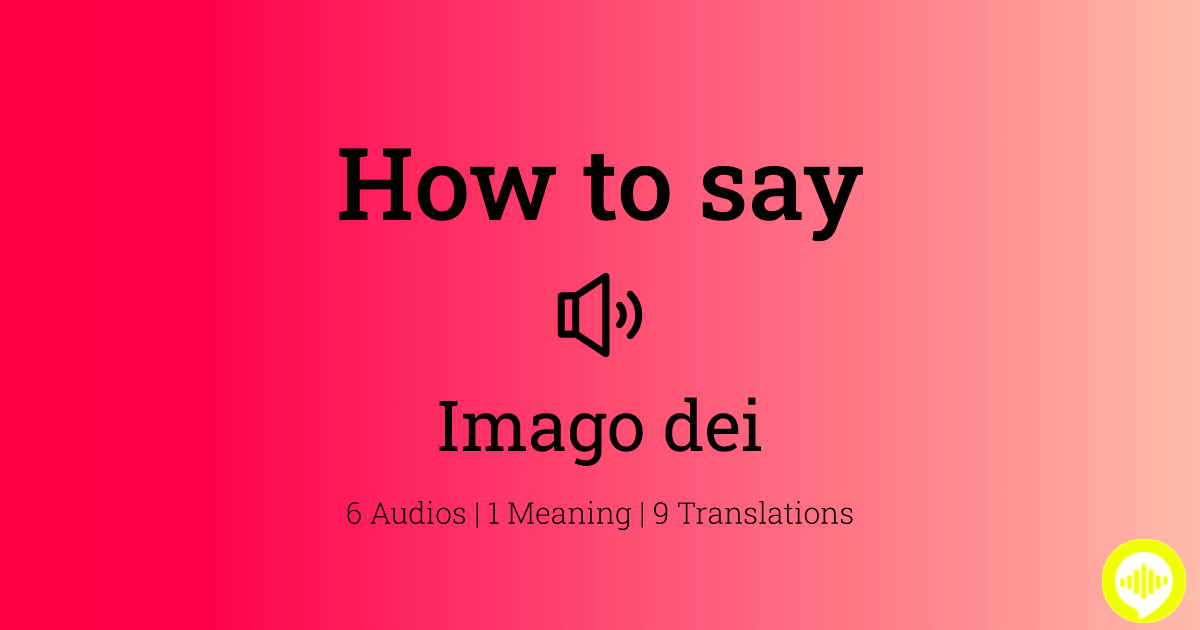The term “Imago Dei” comes from Latin and translates to “Image of God.” It is a concept rooted in theology, describing the unique way humans reflect God’s attributes. According to this idea, every individual carries a divine imprint, emphasizing human dignity and value.
This concept is most commonly associated with Christianity, particularly in the context of the creation story in the Bible. It suggests that humans are created in God’s image, giving them a special role in creation. The idea is not limited to physical resemblance but also includes qualities like morality, creativity, and the capacity for relationships.
Key ideas associated with “Imago Dei”:
- Human Dignity: Every person is valuable, regardless of circumstances.
- Purpose: Humans are designed to reflect God’s nature in their actions and choices.
- Relationships: The ability to connect with others mirrors God’s relational nature.
Understanding the Origin of “Imago Dei”

The concept of “Imago Dei” originates from the Bible, specifically in the Book of Genesis. In Genesis 1:27, it is written: “So God created man in his own image, in the image of God he created him; male and female he created them.” This verse is the foundation of the idea.
Over time, theologians have explored its deeper meanings. In ancient Jewish and Christian traditions, “Imago Dei” has been interpreted as a call to live morally and fulfill a unique purpose. The phrase became central in discussions about human rights, ethics, and theology.
Historical perspectives:
| Time Period | Key Interpretation |
|---|---|
| Ancient Times | Humans as caretakers of creation. |
| Medieval Era | Focus on spiritual and moral resemblance to God. |
| Modern Era | Emphasis on equality, rights, and dignity. |
Also Read This: Imago Images vs. Getty Images: Finding the Right Platform for Your Needs
How to Pronounce “Imago Dei” Correctly

Pronouncing “Imago Dei” can seem tricky at first, but it’s quite straightforward once you break it down. Here’s a simple guide:
- Imago: Say it as “ee-MAH-go” with the stress on the second syllable.
- Dei: Pronounce it as “DAY-ee,” like two syllables.
Together, it sounds like: “ee-MAH-go DAY-ee.” Practicing it slowly a few times helps to get comfortable with the flow.
Interestingly, the pronunciation may vary slightly depending on regional accents or traditions. For example:
- In church settings, you might hear a softer “DAY” for “Dei.”
- In academic discussions, Latin enthusiasts may use classical pronunciation, which sounds closer to “DEE.”
Whichever pronunciation you choose, the meaning and respect behind the term remain the same.
Also Read This: Why Every Blogger Needs Imago Images as Their Ultimate Visual Resource
Why “Imago Dei” Is Important in Theology
The concept of “Imago Dei” holds a central place in theology because it addresses what makes humans unique and valuable. It’s not just about our physical existence but about the spiritual and moral image we reflect of God. This idea influences how humans relate to God, one another, and the world.
Theologically, “Imago Dei” provides the foundation for many doctrines and beliefs. It explains why humans have inherent dignity, why moral responsibility exists, and why relationships matter. Understanding this concept also sheds light on humanity’s purpose in God’s creation.
Key theological implications of “Imago Dei”:
- Human Value: Every person, regardless of age, gender, or background, has worth because they are made in God’s image.
- Moral Responsibility: Reflecting God’s image calls for living ethically and responsibly.
- Redemption: Many Christian teachings on salvation and restoration stem from the idea of restoring the broken “Imago Dei.”
In short, “Imago Dei” reminds believers of their divine origin and their responsibility to live in a way that honors God.
Also Read This: How to Sell on Shutterstock: A Step-by-Step Guide for Photographers
How “Imago Dei” Influences Modern Thought
“Imago Dei” is not just a theological idea; it also influences modern thinking, especially in areas like human rights, ethics, and social justice. The belief that all humans are made in God’s image reinforces the idea of equality and dignity for everyone.
Here’s how it shapes contemporary perspectives:
- Human Rights: The idea supports equality, arguing that all people deserve respect and fair treatment.
- Social Justice: Movements addressing poverty, racism, and inequality often draw from “Imago Dei” to emphasize the value of every life.
- Environmental Stewardship: Since humans are caretakers of creation, “Imago Dei” inspires responsible interaction with the environment.
Whether it’s influencing legal systems or encouraging charitable efforts, this concept connects ancient theology to modern-day challenges.
Also Read This: How to Design an Impactful and Memorable Website Using Imago Images’ Resources
Ways to Reflect “Imago Dei” in Daily Life
Living out the meaning of “Imago Dei” involves more than understanding it; it’s about demonstrating it in everyday actions. Since the concept emphasizes the divine qualities in humans, reflecting it means striving to live in a way that honors God and respects others.
Here are practical ways to embody “Imago Dei”:
- Show kindness and compassion: Treat others with respect, regardless of their background or beliefs.
- Pursue justice: Stand against inequality and help those in need.
- Build relationships: Foster genuine connections with others, reflecting God’s relational nature.
- Use your creativity: Engage in activities that inspire and uplift, whether through art, innovation, or problem-solving.
- Care for creation: Be a good steward of the environment and resources.
Reflecting “Imago Dei” is a lifelong journey of growing in love, service, and purpose, reminding us of our divine identity and mission.
Also Read This: 10 Reasons to Choose Imago Images for Your Visual Content Strategy
Frequently Asked Questions about “Imago Dei”
The concept of “Imago Dei” often raises questions due to its profound meaning and implications. Below are some common questions and answers to help clarify this topic:
1. What does “Imago Dei” mean literally?
“Imago Dei” is a Latin term that translates to “Image of God.” It refers to the belief that humans are created in the image and likeness of God.
2. Does “Imago Dei” mean humans look like God?
No, it doesn’t necessarily mean a physical resemblance. Instead, it emphasizes qualities like morality, creativity, relational capacity, and the ability to reason.
3. Where is “Imago Dei” found in the Bible?
The concept originates from Genesis 1:27, where it is stated that God created humans in His own image.
4. How does “Imago Dei” influence human rights?
“Imago Dei” underlines the inherent dignity and worth of every individual, serving as a foundation for human rights and equality.
5. Can non-religious people connect with the idea of “Imago Dei”?
Yes, many aspects of “Imago Dei,” such as valuing human life and dignity, resonate beyond religious contexts and align with universal ethical principles.
If you have further questions, exploring theological discussions or consulting religious texts can provide deeper insights into this powerful concept.
Conclusion on Understanding “Imago Dei”
The concept of “Imago Dei” is a profound reminder of human value, purpose, and connection to the divine. Whether viewed through a theological or philosophical lens, it emphasizes dignity, equality, and responsibility. Reflecting “Imago Dei” in daily life helps us honor our shared humanity and live with greater compassion and purpose.











